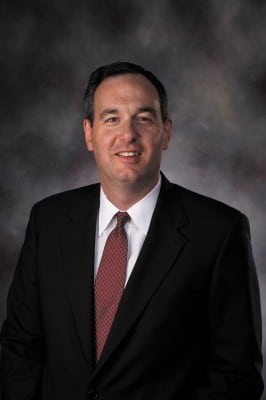
Some boys aspire to become astronauts; others want to be police officers or firefighters. Douglas M. Hagerman grew up thinking he would become a physician. But as a college student, he realized that his interests lay more in economics and policy, so he switched majors, took the certified public accountant exam after graduation, and eventually wound up at Harvard Law School. Now, as general counsel of Rockwell Automation, Inc. Hagerman leads a team that handles all of the legal issues for the Milwaukee-based company, which specializes in industrial control and automation technology. Hagerman chats with Profile about the importance of raising your sights—and staying in shape.
You are senior vice president and general counsel of a $5.9 billion, publicly traded company. What is the secret of your success?
My philosophy is to build a great legal team, give them some objectives, and let them go, while I handle a broader set of issues. While I do get involved directly with our most significant legal challenges, I have lieutenants who actually handle 99 percent of the company’s legal matters. I’m there to provide guidance and to perform more general executive functions. As a senior executive, I identify other, nonlegal issues to get involved in. For me, that’s anywhere where I think I can make a difference. I’m fortunate to work for someone who welcomes me in a broader professional role.
You’ve also instituted some innovative revamping of the methods with which Rockwell’s legal team works with third-party counsel. Can you explain how you did this?
Almost every company has both in-house and outside counsel. If we need to negotiate a contract with key suppliers, someone on staff will do that. If someone sues the company in Mississippi, for example, we’ll hire someone on the ground there to handle the case, but we will oversee their work.
What we’ve done is to put all of our outside counsel spending into an electronic billing system that gives us rich data about what we’re spending money on and how to effectively manage it—we call ourselves an information-enabled legal department. We have also done a lot in terms of alternative billing arrangements with our law firms. Half of our annual spending is now alternative—meaning an alternative to billing by hour, which instantly separates my interests, as the company, from the interests of outside counsel, who benefit more from charging by the hour. That’s why we think we get a better relationship and better results if we use alternative fee arrangements. For example, when we hire people to write patent applications, we pay them a fixed fee. Through these various techniques, we have managed to cut our outside-counsel spending in half.
You are also secretary of the company’s board of directors. What does that entail?
As secretary, but not a member of the board, I am responsible for planning our board meetings, taking care of communications, and ensuring that the board goes through right processes when making decisions. I advise the board on how to approach decision making. So I act as a management liaison to the board, trying to make meetings run smoothly and help the board function more effectively. It’s a position that helps promote effective corporate governance.
You have described yourself as an “exercise maniac.” Do you have a daily routine?
While I was never much of a serious athlete, I try to take care of myself and I exercise six days a week. For instance, I rode my bike to work this morning; that’s seven miles to work and seven miles home, so it’s like two short workouts. I feel like I’m sharper and a better contributor at the office when I’m fitting in my time at the gym or on the bike.
What advice would you offer to attorneys just starting hoping to emulate your success?
It’s easy to tell them to work hard, and it’s true, they do need to work and work hard. But I think the key is to constantly lift your vision higher as you’re developing your career. Don’t look only at the current project or task at hand; look at the bigger picture and try to figure out how what you’re working on now fits into the broader issue that needs to be solved. Start worrying about how you’re going to win the trial instead of the brief that’s due next week. As in-house counsel, the day you raise your vision from “I’ve got a contract to complete” to “What are the main legal and risk issues facing this business?”, you’ve found a way to add infinitely more value to the company. The bottom line is: raise your sights.


